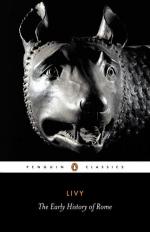|
This section contains 467 words (approx. 2 pages at 400 words per page) |

|
The Early History of Rome: Books I-V Summary & Study Guide Description
The Early History of Rome: Books I-V Summary & Study Guide includes comprehensive information and analysis to help you understand the book. This study guide contains the following sections:
This detailed literature summary also contains Topics for Discussion and a Free Quiz on The Early History of Rome: Books I-V by Livy.
This is a work on the history of the city of Rome. This location had become the heart of the Empire named for it. Due to its import in the preservation of knowledge through time, it's role is that of a classic work. The length of the Roman Empire assured that by the time of the author, there was a great deal of history to write about already.
The author was a man of the age: Titus Livius's date of birth is not precisely known. There are two closest estimations: one is 59 BC, the other is 64 BC. He was not born in the city of Rome, but did move there. After his relocation he lived there for the rest of his life. He passed away in 17AD in his home town of Padua.
Titus Livius's history was recognized immediately by his contemporaries as far superior to any previous work of its kind. Much later, in 369AD, a Roman Senator had the works re-published. Readers are informed that it is thanks to this action that the books are available today. There is only one other point to emerge from the introductory material. The work was produced when Rome was in her prime.
There is much of value for readers, as so many aspects of Rome's history are included. In that regard it is a fairly thorough work. Political elements of the history are covered. There are mythical parts of the history. The author takes care in many cases where it is difficult to distinguish the facts from the fiction to clarify. This is quite helpful to the reader. The development of the physical situation of the city is provided. It is full of surprises, at least to those who are novices when it comes to the subject of history. One of the keys to this book is that it shows readers the main forces that created the city as a whole. How the culture of it grew and how that related to events and forces is also shown. Along with of course is also an explanation of the military campaigns led from Rome.
There is no question about it: Rome was founded by creative, and aggressive people. It may not have survived had it not been assertive, but it chose of its own free will to be one of the most or thee most aggressive urban site in the entire area. For readers of today, these show the seeds that enabled the powers that grew into an entire Empire which blazed for a long time before receding back to the condition of being a powerful city.
Titus Livy provides readers with precisely what he has promised. He has written an in depth, accurate presentation of the first four to five generations of Roman history.
Read more from the Study Guide
|
This section contains 467 words (approx. 2 pages at 400 words per page) |

|



